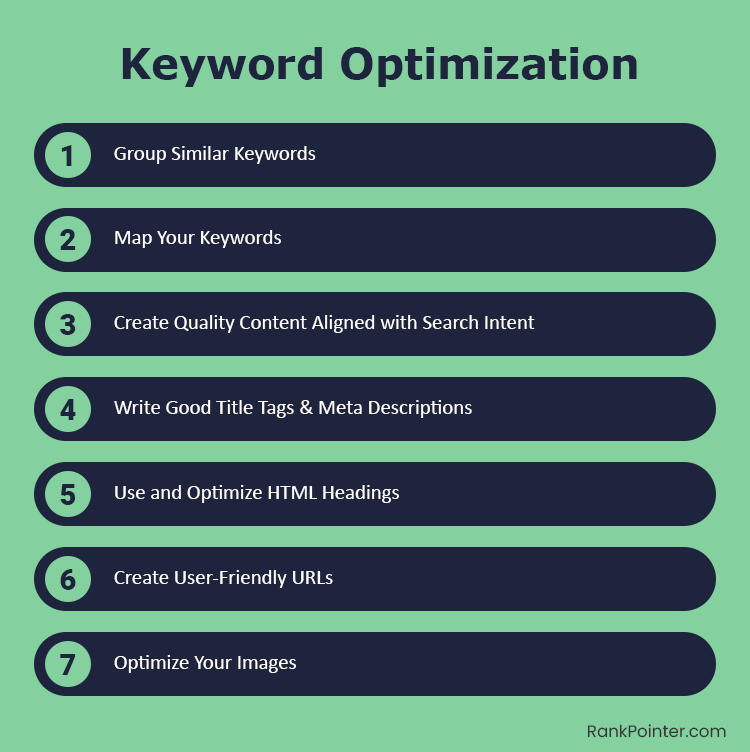Beyond merely identifying popular search terms, effective keyword optimization is about strategically integrating these keywords into your content to enhance visibility and attract relevant traffic. This comprehensive guide explores the intricacies of keyword optimization in SEO and provides actionable strategies to achieve better rankings.
What Is Keyword Optimization?
Keyword optimization involves enhancing your web pages to effectively utilize target queries, thus increasing discoverability on search engines.
It diverges from keyword research, focusing on strategic deployment rather than mere selection. Utilizing appropriate keywords in optimal locations and manners is pivotal for achieving SEO objectives.
Furthermore, it constitutes an ongoing endeavor, as user search preferences and search engine criteria evolve over time, necessitating continual refinement of content.
Why Is Keyword Optimization Important?
1. Improves Visibility in Search Engines
Keyword optimization acts as a beacon for search engines, indicating content relevance to specific queries. Strategic keyword usage propels content to SERP summits, increasing visibility, and thereby driving traffic, leads, and conversions.
2. Provides Value to Users
SEO keyword optimization transcends search engine algorithms, focusing on enriching user experiences. By integrating relevant keywords into quality content, audience needs are met, fostering trust, credibility, and potential customer loyalty.
How to Optimize for Keywords to Boost SEO Success?
Keyword optimization strategies are explained below.

1. Group Similar Keywords
Keyword clustering consolidates related terms, enabling the targeting of entire groups with a single page. Incorporating diverse relevant search terms broadens visibility across various search results, thereby driving increased traffic.
2. Map Your Keywords
Keyword mapping allocates specific keywords to distinct website pages, optimizing site structure and content coherence. This strategic planning prevents keyword overlap across multiple pages, enhancing overall search engine optimization effectiveness.
3. Create Quality Content Aligned with Search Intent
Crafting high-quality, relevant, and engaging content aligns with users’ search intent, improving search result rankings. Understanding user intent—be it informational, navigational, commercial, or transactional—ensures content resonates with audience needs.
4. Write Good Title Tags & Meta Descriptions
Well-crafted title tags and meta descriptions, incorporating primary keywords, enhance search engine understanding of page content. Keeping tags within optimal character limits and crafting compelling descriptions encourages user click-through, boosting website traffic.
5. Use and Optimize HTML Headings
Utilizing HTML headings clarifies page content hierarchy for both users and search engines. Including target keywords in headings, maintaining character limits, and aligning with title tags enhances content structure and readability.
6. Create User-Friendly URLs
Descriptive and concise URLs, incorporating target keywords, improve user understanding and search engine indexing. Prioritizing natural language and simplicity fosters better SEO performance and user experience.
Useful Article: URL SEO: How to Create SEO-Friendly URLs
7. Optimize Your Images
Implementing image SEO best practices, such as incorporating target keywords into file names, alt text, and captions, enhances image search visibility. This optimization strategy increases traffic from traditional and image search results, improving overall website performance.
Learn More: Image Optimization in SEO: Tips and Best Practices for Better Ranking
Conclusion of Keyword Optimization in SEO
Keyword optimization lies at the heart of successful search engine optimization endeavors, offering a pathway to enhanced visibility, engagement, and conversions. Driving sustained growth and competitive advantage by implementing a strong keyword optimization strategy.


